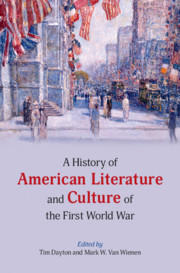Book contents
- A History of American Literature and Culture of the First World War
- A History of American Literature and Culture of the First World War
- Copyright page
- Contents
- Figures
- Contributors
- Acknowledgments
- Introduction America’s Great War at One Hundred (and Counting)
- Part I Genre and Medium
- Part II Settings and Subjects
- Chapter 9 The Peace Movement
- Chapter 10 Americans in France
- Chapter 11 German Americans
- Chapter 12 The English in America
- Chapter 13 Preparedness
- Chapter 14 Propaganda
- Chapter 15 Conscientious Objectors
- Chapter 16 Volunteers
- Chapter 17 African Americans
- Chapter 18 In the Midwest
- Chapter 19 In the South
- Chapter 20 Revolution
- Chapter 21 Monuments and Memorials
- Part III Transformations
- References
- Index
Chapter 14 - Propaganda
Martialing Media
from Part II - Settings and Subjects
Published online by Cambridge University Press: 23 January 2021
- A History of American Literature and Culture of the First World War
- A History of American Literature and Culture of the First World War
- Copyright page
- Contents
- Figures
- Contributors
- Acknowledgments
- Introduction America’s Great War at One Hundred (and Counting)
- Part I Genre and Medium
- Part II Settings and Subjects
- Chapter 9 The Peace Movement
- Chapter 10 Americans in France
- Chapter 11 German Americans
- Chapter 12 The English in America
- Chapter 13 Preparedness
- Chapter 14 Propaganda
- Chapter 15 Conscientious Objectors
- Chapter 16 Volunteers
- Chapter 17 African Americans
- Chapter 18 In the Midwest
- Chapter 19 In the South
- Chapter 20 Revolution
- Chapter 21 Monuments and Memorials
- Part III Transformations
- References
- Index
Summary
The period of American neutrality during the first three years of World War I (1914-1917) was marked by widespread disagreement. Widespread propaganda advocated neutrality as well as intervention on either side. Propaganda advocating different positions nevertheless tended to use some of the same—often gendered and sexualized—imagery to solicit and channel American emotions. Once the US declared war, the creation of a state-sanctioned propaganda agency, The Committee on Public Information (CPI), produced a flow of information that was both intense and univocal in its support for the war. Meanwhile, legislative acts legalized censorship, enabling the Post Office, government at all levels, and even non-state actors to police speech, jail and attack pacifists, and limit dissenting publications. The widespread use of media to secure public consent for and participation in the war effort is an element of modern, total war. The media landscape was permanently changed. Propaganda moved through social channels and frequently targeted and depended upon women to both relay and follow its messages; after the war, largely as a result, women gained the vote. Other legacies were more negative. Some modernist writers and artists would denounce martial (ab)uses of language and to adopt new strategies (including irony) to undermine notions of linguistic and political certainties.
Keywords
- Type
- Chapter
- Information
- Publisher: Cambridge University PressPrint publication year: 2021



